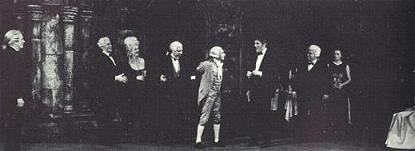 POOR BITOS
POOR BITOS
(1964 Broadway Comedy/Drama)

JEAN ANOUILH'S 'POOR BITOS' OPENS
A review by Howard Taubman of THE NEW YORK TIMES
In his darkest vein of black comedy Jean Anouilh is using Poor Bitos to say a plague on both your houses---the upper classes against whom revolutions are made and the ruthlessly, bloodthirsty men who make revolutions.
Poor Bitos, which opened Saturday night at the Cort Theater, finds a fleeting moment to speak compassionately of the vast multitudes of people caught between the contending forces and to show several in an attitude of generosity. But the burden of the play, being presented in Lucienne Hill's supple English translation, is an icy contempt for the meannesses, condescensions of men and women of high and low estate.
Mr. Anouilh is most savage in his portrayal of poor Bitos, the arid, unyielding little deputy public prosecutor who 10 years after the last war is still pitilessly hunting down collaborationists in a French provincial town. Bitos is equated with Robespierre. Indeed, in a kind of grim masquerade he becomes the chairman of the French Revolution's Committee of Public Safety dealing death to foe and colleague in the horrors of the Reign of Terror.
No playwright is more skillful than Mr. Anouilh at theatrical tours de force. Like The Rehearsal, Poor Bitos juggles past and present, getting contemporaries into the costumes and personae of another age and turning the masquerade into a means of self-revelation. The difference in Poor Bitos is that historic figures, rather than characters in an old play, are invoked.
What Mr. Anouilh sets out to do he carries off with theatrical mastery. He weaves reality and make-believe into a subtle web that intensifies the reality. He tells us a good deal about his view of the French Revolution and some of its chief movers and shakers. He reminds us that the hidden forces that shaped men like Robespierre and Danton on the one side and the aristocratic Mirabeau and the wealthy Tallien on the other repeat themselves ad infinitum, for man is unchangingly erring, flawed man.
While I admire the skill of Mr. Anouilh's demonstration and particularly the dazzling brilliance of Donald Pleasence's Poor Bitos alias Robespierre, I find myself jibbing at the implications of this character. Mr. Anouilh's command of history and Robespierre's psychology may be well founded. Certainly there is no doubt of the revolutionists's savagery. But is it really the same thing as bringing Nazi collaborationists to heel?
It is true that Poor Bitos is at pains to prove that Bitos's uncompromising self-righteousness has no mercy for the weak or the innocent. It may be also be argued that Bitos is one nasty little man and not representative of all those who sought to mete out justice of this kind after the war. But it is the essence of Mr. Anouilh's play that Bitos is equated with Robespierre, and the moral to be drawn from the character is even more disquieting than the playwright means it to be.
There can be no reservations about the way Mr. Anouilh develops his theme, nor, apart from a suggestion of cockney in some of his speeches, about the manner in which Mr. Pleasence plays Bitos-cum-Robespierre. One begins by admiring the actor's virtuosity, but as in his unforgettable performance in The Caretaker one quickly forgets about the niceties of the performer's craft and is subdued by the completeness with which the character is absorbed.
Poor Bitos arrives in the ancient crypt-like hall to attend a party mischievously planned by his host, Maxime, who loathes him. All but one of the guests invited to goad, mock and humiliate him are there when he enters in the blue coat and breeches, linen neckcloth and powdered wig of his Robespierre getup.
The others are in dinner clothes, wearing wigs and headdresses as their only costume change. Looking small, desiccated, shrewd, yet eager to be sociable, Mr. Pleasence immediately conveys the image of a defensively aggressive little man in a hostile environment.
Later as Robespierre being caned in memory by a clerical teacher for a sin of pride, he is a creature on a cross. His awkwardness and intensity in the presence of the lordly, witty Mirabeau are anguished. His distaste for Danton's impetuosity and virility rises in him like a violent illness. As Bitos again he lets himself get drunk and cajoled into dropping his defenses with a sickly amiability. At the end he is a fierce, racked animal whose only response to a kindness is that he has another injury to avenge.
Shirley Butler, who also directed Poor Bitos in London, has fused all its bitter and malevolent elements into a performance that has both intellectual glitter and visceral fury.
Second only to Mr. Pleasence in the fullness of his portrayal is Charles D. Gray as the elegant, spiteful Maxime. There are also impressive performances by C.K. Alexander as a worldly, courtly Mirabeau figure, John Devlin as a factory manager, Roy Poole as the Danton impersonator, Michael Lombard as a schoolmaster who despises Bitos while believing in the things he is supposed to stand for, and Diana Muldaur as the fine girl Bitos would like to marry.
Poor Bitos is an angry play, as vindictive about smallness and cruelty as its principal antagonists. It has no use for the malicious well-born, rich and powerful and even less for the sanctimonious, murderous bearers of change. It is so busy demolishing those whom it hates that it scarcely adumbrates the possibility of decency. Though not a comforting play, it cannot be ignored, thanks to its controlled wrath and Mr. Pleasence's remarkable work.
Review © 1964 THE NEW YORK TIMES. All Rights Reserved.
[ NEW YORK WORLD-TELEGRAM (Review #1) | TIME MAGAZINE (Review #3) | PHOTOS | LINKS ]
Photos by Friedman-Abeles
Photos © 1964 Friedman-Abeles / Prince / Cordon and PLEDON LIMITED. All Rights Reserved.
Title and logo designed by Karen Rappaport

[ THEATRE | HOME ]

